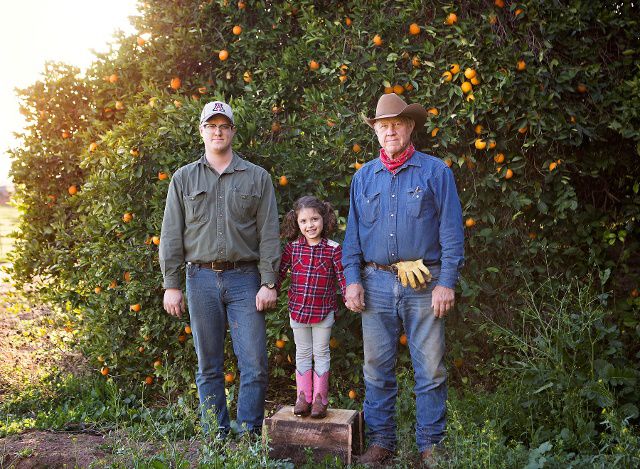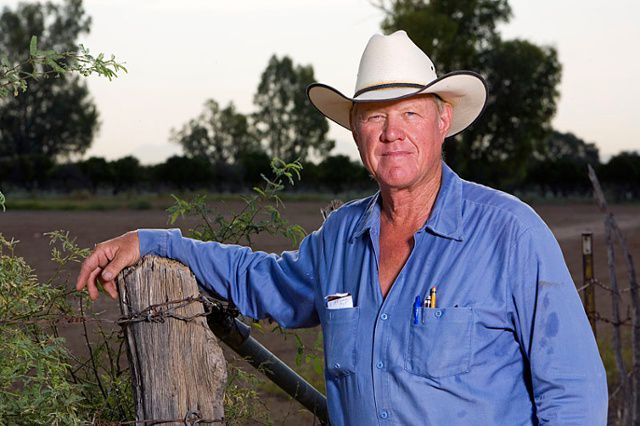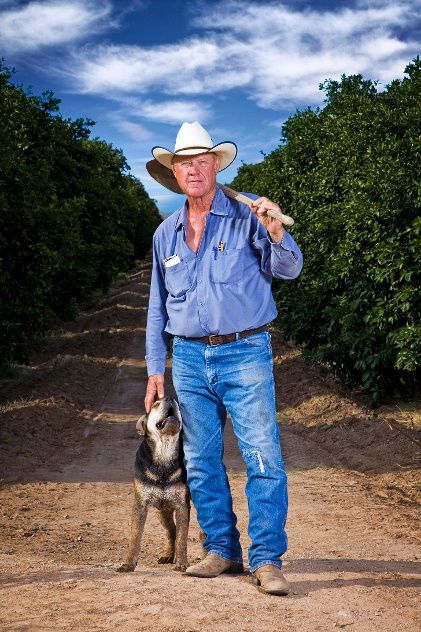Meet Arizona Agriculture’s Justice Family
Published
5/23/2017
By Katie Aikins, Arizona Farm Bureau Ag Education Director with contributions from Julie Murphree, Arizona Farm Bureau Outreach Director: DeWayne and Selwyn Justice operate Justice Brothers Ranch in Maricopa County. Like his father, DeWayne, Selwyn has lived on the farm his entire life. His family has a rich history in agriculture: His dad’s side of the family has been farming the land they are on today since 1928, and his mom’s dad worked his family’s dairy when he was a young man, but got out of farming in favor of ironworking. Selwyn’s mom, Pamela, married her family back into farming, and she worked Justice Brothers Ranch for the better part of two decades. She now works for the University of Arizona Cooperative Extension in Maricopa County as a Natural Resources Educator. Selwyn’s sister, Terra

Three generations of Justice: (left to right) Selwyn,
Selwyn’s great-grandfather purchased the ground in
Part of an ongoing series about Arizona farming and ranching families.
Interview with Selwyn Justice from Maricopa County.
Tell Us About your farm and ranch operation: The farm is a little short of 400 acres. Citrus is grown on 71 of those acres, and the orchard is organically certified. Most of their Red Grapefruit, Navel and Valencia Oranges, Minneola Tangelos, and Lisbon Lemons trees are over 50 years old. The rest of the Justice Brothers Ranch is used to pasture graze Charolais-Hereford beef cattle, which are shipped to Marana and sold at
Harvest begins in November and by then the fruit has color and is hanging heavy in the trees. Grapefruit

With an expertise in water management, DeWayne Justice believes conservation of resources and farming go hand in hand.
The citrus is harvested by
The bulk of Justice Brothers’ grapefruit is shipped via flatbed trailer to Rio Rico, where it is processed in an organic packing house and sold under the Patagonia Orchards label to Kroger and a few smaller supermarket chains. The rest of the fruit is sold to several farmer’s market vendors, including Crooked Sky Farms, T&J Fresh and Local Farms, Blue Sky Organic Farms, and others. They just started selling to a brewery in neighboring Surprise, as well as an outfit that makes kombucha up in Sedona. They are always looking for more vendors of any size, from market stall operators to Bashas.
What does Selwyn like about growing citrus? “Getting paid is nice, but no one gets into farming to get rich. From my dad’s perspective, having access to the best fruit, from the first of the season to the fruit that has ripened to the point that your teeth ache
Most people do not realize that every commercially productive citrus tree is actually two different trees growing as one. The bottom of the tree, called the rootstock, is a variety of citrus selected for its toughness in the climate and its compatibility with the top of the tree, called the scion, which is the part of the tree that produces fruit. The buds of the scion are grafted to the rootstock in by either peeling back the bark of the rootstock, leaving just the tip of the bud showing so it can
An interesting fact about Justice Brothers Ranch is that they also operate what was formerly known as the University of Arizona Maricopa County Citrus Experiment Station. This portion of the farm produces a huge list of over 80 varieties of

On of the orchards in the background that DeWayne and Selwyn manage.
The following questions we asked Mr. Justice to Answer directly.
Any farming practices that highlight water conservation, soil health or and other special practice you instituted to save money and improve the farm? I’m actually part of a start-up that uses sensor technology and data analytics to help producers conserve water, reduce the frequency and volume of input applications, and develop farm management practices that reflect a more comprehensive understanding of our farms and ranches.
What is your educational background (i.e. Degree(s), certifications, honors)? I hold a bachelor’s in both business management and entrepreneurship from the U of A, as well as an associate's or two from Glendale Community College.
What are your community activities? I’m a member of the AgriBusiness & Water Council of Arizona, the Arizona Cattlemen’s Association, as well as my local irrigation and electrical districts, and try to make meetings when I can. I also serve on the board of directors for a local non-profit that focuses on secular governance. And, I am of course an active agriculture member of Arizona Farm Bureau.
What do you love the most about farming, ranching, or the agriculture industry in general? I love working outside, bar none. I say I’m solar powered; if I’m not at the ranch or in the orchard, I’m usually hiking or camping. It’s almost impossible to get me to stay in the office. If it’s not that, then it’s the fact that new challenges and opportunities present themselves every day. I’ve never got to worry about things getting too routine.
What do you enjoy doing, and what is one fact/achievement that nobody knows about you? As I mentioned before, I love hiking and
[The author’s found out some other special facts about the Justice family]: About Selwyn’s trek across
Why are you a Farm Bureau member? I honestly don’t know why you wouldn’t be a member if you are a farmer or rancher. Agriculture in Arizona alone is a 17 billion dollar
How will the next generation of agriculturalists have to operate? Farmers have always been adopters of technology that proved itself useful for as long as we’ve got a record of farming. The technology on the horizon is going to give us a chance to get even better at allocating our resources and doing more with what we’ve got. Sensing and automation technology are going to drivers of the next stages of our industry, and our next generation will without a doubt be relying more on data analytics, setting aside broad applications in favor of targeted input delivery, and real-time adjustments in our resource use.
As the battle for water continues here in the southwest, we’ll have to do even more with regard to water conservation for two reasons: one, because of the growing pressure on the resource itself; two, to defend our allocation and demonstrate to our poorly informed public that we are better stewards of the water we are using than the municipal users can be.
What is the best business advice that you’ve received and/or have given? Two pieces of advice I’ll never be able to beat:
- Take calculated risks when you can, but if you’re going to fail, fail hard, fail fast, and get back in the saddle.
- My grandfather’s favorite piece: The graveyard is full of indispensable people.
Delegation is an integral part of a healthy operation, and even though a lot of us in agriculture can’t help but work every waking hour, you’ve got to take time, when you can, to get your boots off the ground.
What business-oriented advice would you give other farmers and ranchers? Pay your membership dues and show up to meetings. Agriculture is one of the most regulated industries in the U.S., as we all know, and if we’re not making sure that our representation at the capitol and D.C. reflects our experience and struggles, our whole industry suffers, especially on the bottom line.
Talk to the consumer as often as you can. Some of us don’t sell direct, but we still have to keep talking to the folks that eat our food and wear our fiber about what, how, and why we’re producing. If you don’t talk to them about farming, someone who doesn’t produce is more than happy to, and their agenda more often than not isn’t aligned with ours.